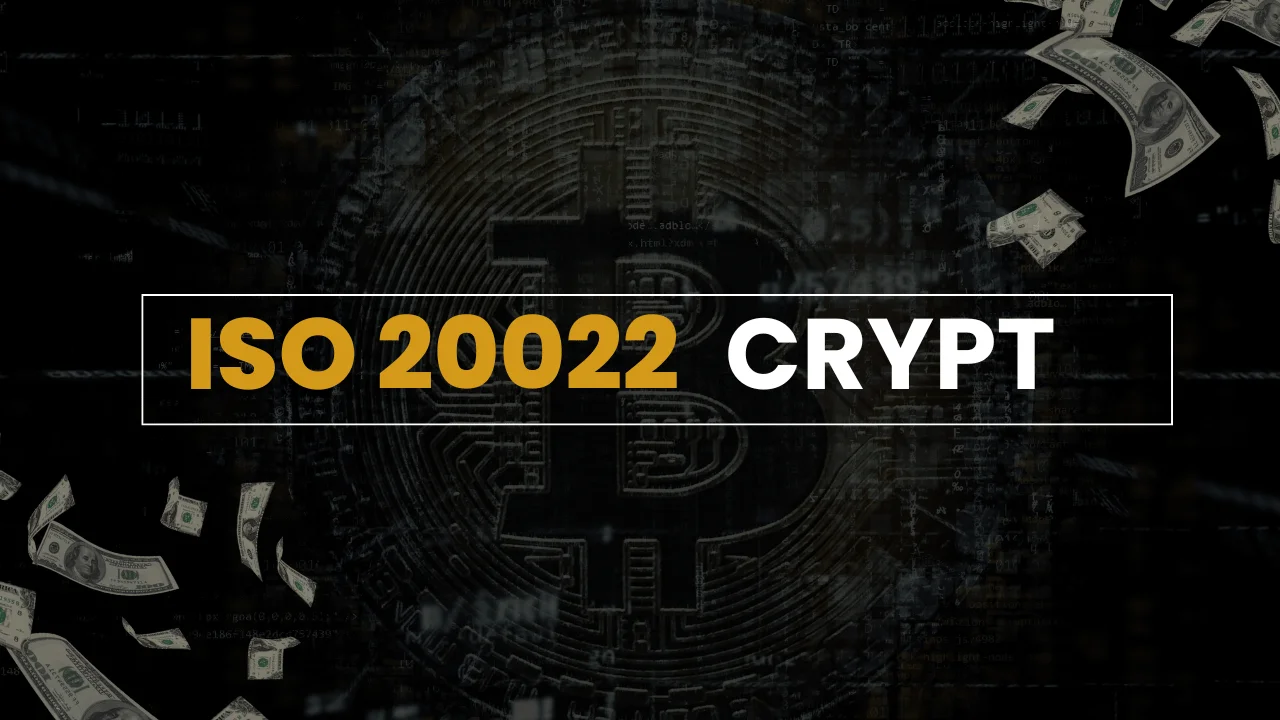The introduction of ISO 20022 to the cryptocurrency industry is a giant leap forward for the digital currency ecosystem’s financial messaging standardization and interoperability. By improving efficiency, security, and transparency, this standard seeks to transform the way digital currencies are integrated into the larger financial infrastructure. A key player in the evolution of financial ecosystems, ISO 20022 Crypto be instrumental in facilitating real-time payments and complicated cross-border transactions.
Understanding ISO 20022
When it comes to electronic data interchange between banks, ISO 20022 is the gold standard. A unified framework for exchanging information is made possible through its ability to enable consistent and enriched data communication across diverse financial systems. Financial institutions can improve compliance with regulatory requirements, streamline operations, and reduce fragmentation by leveraging ISO 20022.
The Impact of ISO 20022 on Cryptocurrency

The goal of implementing ISO 20022 into the bitcoin ecosystem is to unite conventional finance with digital assets. Improved efficiency, security, and visibility into cryptocurrency transactions are just a few of the advantages offered by this integration. It also helps with complex data structures, which means you can have all the information about your transactions and be more in line with regulations.
Enhanced Efficiency
Higher degrees of automation in crypto transactions are made possible by ISO 20022, which minimizes the risk of mistakes and the need for human intervention. Because of the increasing importance of real-time payments and complicated cross-border transactions, this is more important than ever.
Improved Security and Transparency
Better auditability and traceability of crypto transactions can be achieved by adopting ISO 20022, which helps with AML and CFT efforts. The increased confidence in the cryptocurrency ecosystem is a direct result of these improved security and transparency measures, which in turn encourage more widespread use and integration with more conventional financial systems.
Streamlining Crypto Integration with Traditional Finance
The widespread use of ISO 20022 in the cryptocurrency industry has made it much easier to incorporate digital currencies into established monetary systems. A more unified and effective financial system is the result of this integration, which lessens the discordance brought about by different systems and protocols.
Real-Time Crypto Payments
The transition to instantaneous cryptocurrency payments is something that ISO 20022 is on board with. In the lightning-fast realm of digital currencies, this capability is crucial for facilitating precise and immediate transactions.
Cross-Border Crypto Transactions
The efficiency of cross-border crypto transactions is enhanced by the standardization provided by ISO 20022. International transactions are made easier, faster, and cheaper by enabling consistent and enhanced data communication, according to ISO 20022.
Compliance with Regulatory Requirements
Compliance with regulatory requirements can be improved with the help of ISO 20022’s detailed data structures. With regulators looking more closely at the cryptocurrency space, this is more crucial than ever. There will be fewer chances of legal and compliance problems with crypto transactions if they follow ISO 20022.
Future of ISO 20022 in the Cryptocurrency Industry

With more and more banks and fintechs using ISO 20022 for cryptocurrency, the standard is well-positioned to support future financial ecosystems. This adoption will lead to a more efficient, secure, and transparent financial landscape by integrating digital assets with traditional finance and fostering greater trust between the two.
Key Features of ISO 20022 for Digital Assets
The digital asset ecosystem is a good fit for ISO 20022, thanks to its many useful features. Some of these features include strengthened security measures, better interoperability, and enhanced data structures. All of these parts work together to form a solid foundation that the cryptocurrency industry can rely on.
Enriched Data Structures
Comprehensive transaction details are made possible by ISO 20022’s enriched data structures, which improve compliance with regulatory requirements and increase the overall transparency of crypto transactions.
Improved Interoperability
Interoperability among various financial systems and protocols is enhanced by the standardization provided by ISO 20022. For the integration of digital assets with conventional finance to be smooth and effective, this capability is crucial.
Enhanced Security Measures
Fraud and cyberattacks are two of the risks that crypto transactions face, and ISO 20022’s improved security measures assist to reduce these risks. Crypto ecosystem integrity and fight against financial crime are both bolstered by ISO 20022, which improves auditability and traceability.
Challenges in Adopting ISO 20022 for Crypto
The implementation of ISO 20022 in the cryptocurrency industry is not devoid of obstacles, despite the numerous advantages it offers. Significant technology upgrades are required, integration is complicated, and stakeholders used to the current system may be resistant.
Technological Upgrades
Existing systems will need to undergo substantial technological upgrades in order to implement ISO 20022. Supporting the standard requires financial institutions and fintech companies to invest in new technologies and infrastructure, which can be a time-consuming and costly process.
Complexity of Integration
Because of the potential complexity, considerable planning and coordination are often required to integrate ISO 20022 with preexisting systems. This level of complexity can be a challenge for organizations that are smaller and have fewer resources when it comes to adoption.
Resistance from Stakeholders
The implementation of ISO 20022 may face opposition from stakeholders who are used to the status quo. The standard’s advantages must be well-communicated and educated about in order to overcome this resistance, and a transparent plan for its implementation must also be in place.
Steps for Implementing ISO 20022 in Cryptocurrency Platforms
Businesses should take a methodical approach to implementing ISO 20022 in cryptocurrency platforms. An exhaustive evaluation of current systems, a detailed plan for implementation, and continuous stakeholder engagement are all components of this strategy.
Assessment of Existing Systems
An exhaustive evaluation of current systems is the initial stage in applying ISO 20022. In addition to determining the precise needs for sustaining the standard, this evaluation should reveal any deficiencies or room for development.
Development of an Implementation Plan
A thorough implementation strategy should be developed by organizations after the assessment is finished. Included in this plan should be a description of the procedures, resources, and risks that will be necessary to implement ISO 20022.
Engagement with Stakeholders
To make sure everything goes smoothly, it’s important to keep stakeholders in the loop throughout the implementation. Businesses need to let their customers know how great ISO 20022 is, listen to their complaints, and keep them updated on their progress.
Examples of Financial Institutions Adopting ISO 20022 for Crypto
A number of fintech firms and financial institutions have started using ISO 20022 for cryptocurrency transactions. These groups see the value in the standard and are pioneers in the movement to combine digital money with more conventional banking services.
Future Trends of ISO 20022 in the Cryptocurrency Industry
A number of developments are probable in the bitcoin sector as ISO 20022 adoption rates rise. The evolution of regulatory frameworks, the creation of new technology to back the standard, and the growing cooperation between conventional finance and digital assets are all examples of these tendencies.
Increased Collaboration
There will probably be more cooperation between conventional finance and digital assets after ISO 20022 is adopted. Both industries stand to gain from this partnership’s final product: a financial system that is more streamlined and cohesive.
Development of New Technologies
Innovations in technology to bolster ISO 20022 will be propelled by its widespread adoption. Digital currencies will be further integrated with traditional financial systems as a result of these technologies, which will increase the efficiency, security, and transparency of crypto transactions.
Evolution of Regulatory Frameworks
There will likely be changes to regulatory frameworks to accommodate ISO 20022 as its use grows. A safer and more stable financial system will be the result of this development, which will bring more uniformity and clarity to the regulation of cryptocurrency transactions.
How ISO 20022 Enhances Compliance in Crypto Transactions
Improving compliance in cryptocurrency transactions is where ISO 20022 really shines. In order to assist organizations in meeting regulatory requirements and reducing the risk of financial crime, ISO 20022 offers enriched data structures and improved traceability.
Enriched Data Structures
Better compliance with regulatory requirements is made possible by the enriched data structures enabled by ISO 20022. In the cryptocurrency space, where regulatory scrutiny is on the rise, this capability is crucial.
Improved Traceability
Combating financial crimes like money laundering and terrorist financing is made easier with the improved traceability offered by ISO 20022. Specifically, ISO 20022 aids businesses in detecting and preventing illegal activities by making crypto transactions more auditable.
Reducing the Risk of Financial Crime
The risk of financial crime in the crypto ecosystem is reduced by ISO 20022, thanks to its detailed data structures and enhanced traceability. Digital currencies are being more widely used and integrated with traditional financial systems as a result of the increased trust and confidence brought about by this decrease in risk.
The Role of ISO 20022 in Real-Time Crypto Payments
In order to facilitate real-time payments within the cryptocurrency ecosystem, ISO 20022 is playing an increasingly important role in the financial sector. In order to keep up with the demands of a dynamic and fast-paced market, ISO 20022 facilitates accurate and instantaneous transactions.
Instantaneous Transactions
Instantaneous transactions are made possible by ISO 20022, which enables real-time payments in the crypto ecosystem. Having this capability is crucial in today’s fast-paced market, where precision and speed are of the utmost importance.
Accurate Transactions
Not only does ISO 20022 permit near-instantaneous transactions, it also guarantees the precision of real-time payments. For the crypto ecosystem to continue to function, especially for international and high-value transactions, this precision is of the utmost importance.
Supporting Market Demands
Meeting the demands of a dynamic and rapidly evolving market requires the ability to support real-time payments. Organizations can position themselves to meet these demands and take advantage of new opportunities in the crypto space by adopting ISO 20022.
How ISO 20022 Supports AML and CFT in Cryptocurrency
Most importantly for the cryptocurrency industry, there is the fight against money laundering (AML) and the financing of terrorism (CFT). ISO 20022 lends credence to these initiatives by making crypto transactions more auditable and traceable.
Enhanced Traceability
The improved traceability required by ISO 20022 aids in the detection and prevention of money laundering and the financing of terrorism. To help fight financial crime and make sure the cryptocurrency ecosystem is secure, ISO 20022 makes crypto transactions more auditable.
Improved Auditability
Better adherence to AML and CFT regulations is made possible by ISO 20022’s enhanced auditability. In the cryptocurrency space, where regulatory scrutiny is on the rise, this capability is crucial.
Supporting Regulatory Compliance
Organizations can meet the regulatory requirements for AML and CFT with the help of ISO 20022, which offers improved auditability and traceability. With this backing, people are more likely to believe in digital currencies, which will lead to their wider acceptance and eventual incorporation into more conventional financial systems.
ISO 20022 and Data Communication in Crypto
If the crypto ecosystem is to function smoothly, data communication must be of the highest quality. By providing consistent and enhanced data structures, ISO 20022 is vital in enhancing data communication.
Consistent Data Structures
ISO 20022’s data structures are consistent, which allows for better data communication across different types of financial systems. For the integration of digital assets with conventional finance to be smooth and effective, this capability is crucial.
Enriched Data Communication
When it comes to cryptocurrency transactions, ISO 20022’s improved data communication makes everything more clear and precise. With this update, the cryptocurrency ecosystem can better adhere to regulations and its users can have more faith in it.
Improving Operational Efficiency
The operational efficiency of the crypto ecosystem is enhanced by ISO 20022, which provides consistent and enriched data structures. A more dependable and efficient financial environment is the result of this enhancement, which lessens the need for human involvement and the associated error risk.
Regulatory Implications of ISO 20022 for Crypto
Significant regulatory implications are associated with the crypto space’s adoption of ISO 20022. In order to assist organizations in meeting regulatory requirements and reducing the risk of financial crime, ISO 20022 offers enriched data structures and improved traceability.
Enabling Regulatory Compliance
Better conformity with regulatory standards is made possible by the enriched data structures defined by ISO 20022. In the cryptocurrency space, where regulatory scrutiny is on the rise, this capability is crucial.
Reducing the Risk of Financial Crime
Combating financial crimes like money laundering and terrorist financing is made easier with the improved traceability offered by ISO 20022. Specifically, ISO 20022 aids businesses in detecting and preventing illegal activities by making crypto transactions more auditable.
Supporting a Stable Financial Ecosystem
The development of a stable and secure financial ecosystem is supported by ISO 20022, which enables regulatory compliance and reduces the risk of financial crime. Because of this consistency, people are more likely to use and integrate digital currencies with more traditional financial systems.
FAQs
What is ISO 20022 and how does it impact cryptocurrency?
ISO 20022 is a global standard for financial messaging that enhances the integration, efficiency, and security of cryptocurrency transactions.
How does ISO 20022 improve crypto transaction security?
ISO 20022 improves crypto transaction security by providing enriched data structures that enhance traceability and auditability.
Why is ISO 20022 important for digital currencies?
ISO 20022 is important for digital currencies as it facilitates seamless integration with traditional financial systems, enhancing overall efficiency and compliance.
How does ISO 20022 facilitate crypto interoperability?
ISO 20022 facilitates crypto interoperability by providing a unified framework for data communication across different financial systems.
What are the benefits of ISO 20022 for the cryptocurrency ecosystem?
Benefits of ISO 20022 for the cryptocurrency ecosystem include improved efficiency, security, compliance, and real-time payment capabilities.
Also Check: The Benefits of Using Cryptocurrency for Everyday Transactions
Conclusion
The cryptocurrency ecosystem has made great strides toward financial messaging standardization and interoperability with the release of ISO 20022. Standard ISO 20022 Crypto allows digital currencies to be easily integrated with conventional financial systems by improving efficiency, security, and transparency. With more and more banks and fintechs using ISO 20022 for cryptocurrency, the standard is well-positioned to support future financial ecosystems. This adoption will lead to a more efficient, secure, and transparent financial landscape by integrating digital assets with traditional finance and fostering greater trust between the two.

Brandy Stewart, an enchanting wordsmith and seasoned blogger, weaves compelling narratives that transport readers to uncharted territories. Infused with perceptive viewpoints and dynamic storytelling, Doris exhibits a command of language that enthralls both hearts and minds, leaving a lasting mark on the literary panorama.

